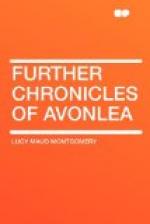But, after all, the dominant current in those same veins was from the race of plain and prairie. The practiced eye detected it in the slender stateliness of carriage, in the graceful, yet voluptuous, curves of the lithe body, in the smallness and delicacy of hand and foot, in the purple sheen on straight-falling masses of blue-black hair, and, more than all else, in the long, dark eye, full and soft, yet alight with a slumbering fire. France, too, was responsible for somewhat in Tannis. It gave her a light step in place of the stealthy half-breed shuffle, it arched her red upper lip into a more tremulous bow, it lent a note of laughter to her voice and a sprightlier wit to her tongue. As for her red-headed Scotch grandfather, he had bequeathed her a somewhat whiter skin and ruddier bloom than is usually found in the breeds.
Old Auguste was mightily proud of Tannis. He sent her to school for four years in Prince Albert, bound that his girl should have the best. A High School course and considerable mingling in the social life of the town—for old Auguste was a man to be conciliated by astute politicians, since he controlled some two or three hundred half-breed votes—sent Tannis home to the Flats with a very thin, but very deceptive, veneer of culture and civilization overlying the primitive passions and ideas of her nature.
Carey saw only the beauty and the veneer. He made the mistake of thinking that Tannis was what she seemed to be—a fairly well-educated, up-to-date young woman with whom a friendly flirtation was just what it was with white womankind—the pleasant amusement of an hour or season. It was a mistake—a very big mistake. Tannis understood something of piano playing, something less of grammar and Latin, and something less still of social prevarications. But she understood absolutely nothing of flirtation. You can never get an Indian to see the sense of Platonics.
Carey found the Flats quite tolerable after the homecoming of Tannis. He soon fell into the habit of dropping into the Dumont house to spend the evening, talking with Tannis in the parlor—which apartment was amazingly well done for a place like the Flats—Tannis had not studied Prince Albert parlors four years for nothing—or playing violin and piano duets with her. When music and conversation palled, they went for long gallops over the prairies together. Tannis rode to perfection, and managed her bad-tempered brute of a pony with a skill and grace that made Carey applaud her. She was glorious on horseback.
Sometimes he grew tired of the prairies and then he and Tannis paddled themselves over the river in Nitchie Joe’s dug-out, and landed on the old trail that struck straight into the wooded belt of the Saskatchewan valley, leading north to trading posts on the frontier of civilization. There they rambled under huge pines, hoary with the age of centuries, and Carey talked to Tannis about England and quoted poetry to her. Tannis liked poetry; she had studied it at school, and understood it fairly well. But once she told Carey that she thought it a long, round-about way of saying what you could say just as well in about a dozen plain words. Carey laughed. He liked to evoke those little speeches of hers. They sounded very clever, dropping from such arched, ripely-tinted lips.




